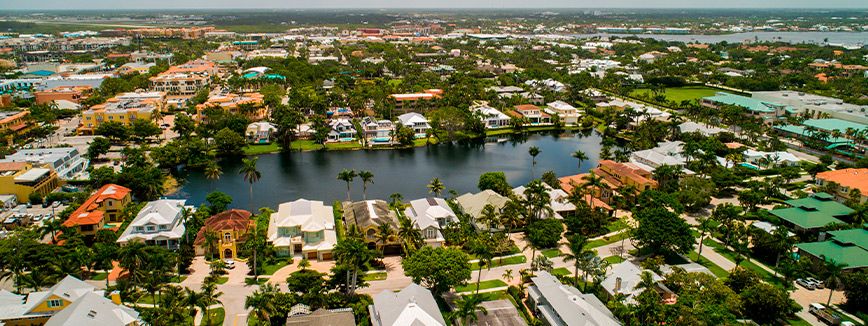How to Prepare for Your Idaho to Florida Relocation: 5 Tips
Moving from Idaho to Florida is more than just an address change. It’s a major lifestyle shift. Trading pine-covered mountains and dry, high-altitude air for sunny coastlines and subtropical heat means planning ahead. Whether your move is for work, family, or retirement, preparing for the environmental, financial, and cultural changes can make your relocation easier.
To help you get started, here are 5 tips to help you navigate your cross-country relocation from Idaho to Florida with confidence.
Tip 1: Prepare for Florida’s humid climate and coastal conditions

With more than 2,600 miles between Boise and Miami, the weather differences are dramatic. Florida’s climate features year-round warmth, high humidity, heavy rainfall, and the potential for hurricanes, quite the contrast to Idaho’s dry summers and snowy winters.
Climate Comparison Between Idaho and Florida
| Climate Feature | Idaho | Florida |
| Average Summer High | 85°F (Boise) | 91°F (Orlando) |
| Average Winter Low | 20°F (Boise) | 49°F (Orlando) |
| Snowfall | 19 inches (Boise) | 0 inches (Orlando) |
| Humidity | Low to moderate | Very high (subtropical) |
(Source: bestplaces.net)
Adjust your wardrobe
Leave your snow gear behind and prepare for warm, wet weather. Florida is warm year-round, but the summer months can become incredibly hot and humid. You will need to prepare for protection not from snow but from the intensity of the sun. Add these items to your wardrobe before you relocate, especially if you are completing your move in the late spring or anytime in the summer, when the weather is at its hottest.
-
- UV-protective, breathable clothing
-
- Quick-dry fabrics for humid conditions
-
- Lightweight rain jackets and umbrellas
-
- Sun hats, sunglasses, and strong SPF sunscreen
Update your home essentials
Regardless of where you end up living in the Sunshine State, your home or rental will need certain items not normally required in Idaho. For example, you will need to reduce moisture in your home, protect your home against hurricanes, and more. Here are a few suggestions to help you create a space that is protected and comfortable no matter what the weather is doing in Florida.
-
- Dehumidifiers to reduce moisture
-
- Storm shutters or impact windows for hurricane season
-
- Ceiling fans and blackout curtains for energy efficiency
-
- Waterproof outdoor furniture and storage
Plan for your health
Florida’s climate can cause heat-related illnesses if you’re not prepared. Eventually, the steps below will become second nature, but until then, make it a point to protect yourself throughout your time in Florida. You can protect yourself by:
-
- Drinking plenty of water
-
- Installing water filtration systems
-
- Learning the symptoms of heatstroke and dehydration
-
- Keeping bug spray handy for mosquitoes in the wet season
Tip 2: Budget for cross-country relocation and Florida living

Interstate moving costs vary, but planning ahead helps minimize surprises.
Moving Costs to Expect
Long-distance moves from Idaho to Florida come with many expenses. Be sure to research and compare moving companies like Peasley Moving & Storage to find the right balance of service and price. Common costs include:
-
- Moving company services
-
- Packing and supplies
-
- Fuel and lodging during the drive
-
- Storage in case your new home isn’t move-in ready
-
- Travel expenses if flying
Get a free quote for your state-to-state move here.
Florida Cost of Living Overview
Florida is generally more expensive than Idaho, especially in popular coastal cities. While there’s no state income tax, expect higher housing costs, utility bills (due to air conditioning), and insurance premiums in areas prone to hurricanes.
Cost of Living Comparison Idaho vs Florida
| Expense Category | Idaho (Avg.) | Florida (Avg.) | Difference |
| Overall Cost | 100% | +7% | +7% |
| Groceries | $300/mo | $325/mo | +$25 |
| Utilities | $150/mo | $180/mo | +$30 |
| Housing | $1,400/mo | $1,600/mo | +$200 |
(Source: mylifeelsewhere.com)
Tip 3: Choose the right Florida community for your needs

Florida’s hundreds of cities cater to every lifestyle. Your ideal new hometown depends on your job, family needs, and personal preferences. Understanding what each city offers can help you find a place that feels like home, whether you’re seeking career growth, family-friendly neighborhoods, or retirement bliss.
Popular Florida Cities for New Residents
-
- Tampa: Great for families and young professionals, Tampa combines affordability with opportunity. It boasts a booming job market, especially in healthcare, finance, and tech. The city also features a revitalized riverwalk, popular sports teams, and family-friendly suburbs like Brandon and Westchase. With proximity to Gulf Coast beaches and a growing arts scene, Tampa balances work and play.
-
- Orlando: While best known for its theme parks, Orlando is more than Mickey Mouse. The city is growing rapidly, fueled by hospitality, tech startups, and education. With master-planned communities like Lake Nona and Winter Garden, families enjoy top schools, parks, and easy airport access. Plus, there are countless cultural events, dining options, and shopping destinations.
-
- Miami: Miami pulses with energy and diversity. From its international business hub in Brickell to its vibrant arts districts in Wynwood and Little Havana, Miami offers a lifestyle full of sunshine, style, and excitement. It’s a haven for those seeking nightlife, multicultural cuisine, and access to Latin American and Caribbean culture. Keep in mind, however, that housing and insurance can come with higher costs due to coastal exposure.
-
- Jacksonville: Jacksonville is Florida’s largest city by area, offering a mix of urban convenience and coastal calm. With a lower cost of living than South Florida and a growing economy, it’s ideal for families, remote workers, and military families (thanks to nearby bases). Neighborhoods like Riverside and Mandarin offer river views, historic charm, and excellent schools.
-
- Sarasota: A perennial favorite for retirees and those looking for a relaxed pace, Sarasota charms with its pristine beaches, walkable downtown, and artsy vibe. You’ll find galleries, opera houses, and farmer’s markets alongside white-sand beaches like Siesta Key. The cost of living is higher, but many find it worth the tradeoff for its small-city sophistication.
What to Consider
Commute and Transit When evaluating your potential Florida community, start with your commute. Larger metro areas like Miami and Orlando suffer from congestion during peak hours, and some regions lack robust public transit systems. Use real-time navigation apps to gauge daily travel times during your likely commute windows. For those who bike or use buses and light rail, research the availability of bike lanes, bus stops, and commuter rail lines. Proximity to your workplace or kids’ schools can significantly impact your quality of life, especially when factoring in Florida’s frequent afternoon storms.
School Districts If you’re moving with children, school quality will likely play a central role in your decision. Use trusted resources like GreatSchools.org to evaluate academic performance, test scores, and parent reviews. Some Florida school districts offer magnet programs or specialized academies, so researching curriculum strengths can also help you identify the right fit. Make sure your new home’s address falls within the correct school boundaries, as these lines can shift and enrollment caps may apply.
Recreation & Culture Think about how you spend your free time. Outdoor lovers might prioritize easy access to Florida’s state parks, golf courses, or nearby beaches, while others may want walkable neighborhoods with theaters, cafes, and weekend markets. Many cities host weekly art walks, food truck rallies, or farmers markets, so review event calendars to get a feel for the local culture. Whether you’re a beach bum, music lover, or food enthusiast, finding a neighborhood that matches your lifestyle can make your relocation more fulfilling.
Hidden Costs Even if a community looks affordable at first glance, dig deeper. Florida homes often come with HOA fees, flood insurance requirements, and utility spikes during summer months. Some neighborhoods with older homes may also require frequent maintenance or upgrades for hurricane preparedness. Meanwhile, newer developments might offset higher housing costs with energy-efficient features that reduce monthly bills. Be sure to weigh the full financial picture, including insurance, utilities, and commuting costs, before making your final decision.
Research Tips
Go beyond online listings by engaging with local communities digitally and in person. Join neighborhood-specific groups on Facebook, Reddit, or Nextdoor to ask questions and read resident reviews. You can often learn about traffic patterns, safety, and the local culture from these conversations.
Consider spending a weekend in your top-choice neighborhoods to walk the area, visit stores, dine out, and observe the environment at different times of day. Pay attention to noise levels, street lighting, and walkability. If you’re relocating for work, talk to coworkers already living in the area to get their perspectives. Renting for the first six months is also a smart way to explore your new city without long-term commitment, allowing you to discover the best fit based on lived experience.
Tip 4: Update your legal documents and registrations

Once you move to Florida, staying compliant with state laws and service providers is a must. Updating your records will help you maintain uninterrupted access to important services, avoid penalties, and protect your legal status in your new home.
Change of Address
Start by submitting a change of address request with the U.S. Postal Service at usps.com. This will ensure your mail gets forwarded while you update your address with individual institutions. Notify your banks, credit card companies, healthcare providers, subscription services, and any organizations that regularly send mail. Don’t forget your employer, voter registration, alumni associations, and even loyalty programs. Missing even one important update could lead to delayed bills, lost packages, or identity verification issues down the road.
Driver’s License and Vehicle Registration
Florida requires new residents to obtain a state driver’s license and register their vehicles within 30 days of establishing residency. Visit your local Florida Department of Highway Safety and Motor Vehicles with proof of identity, residency, and your out-of-state license or vehicle title. Unlike Idaho, Florida typically doesn’t require emissions testing but does require VIN verification. Note that many registrations must be handled in person, so booking an appointment ahead of time can save hours. Once completed, your Florida license becomes a key form of ID for other services, including insurance, school enrollment, and voter registration.
Voter Registration and Insurance
To vote in Florida’s local and statewide elections, you must register here. This is especially important if you’re arriving close to an election cycle. Equally crucial is updating your auto, renters, health, and homeowners insurance policies. Florida’s hurricane exposure and flood risk can significantly affect coverage and premiums. Depending on your new zip code, you may need additional policies, such as wind or flood insurance. Don’t assume your current insurer operates in Florida; shop around if necessary and make these updates early to avoid gaps in coverage.
Additional Records to Update
Don’t overlook other key accounts and records. Transfer medical and dental records to new providers, and ask for referrals if you’re unsure where to start. If you’re a licensed professional (e.g., real estate agent, teacher, nurse), research Florida’s licensing requirements and begin the transfer process before you’re ready to work. Social Security recipients and Medicare users should log in to ssa.gov to update their address. And finally, update your address for all online services, including streaming, food delivery, rideshare apps, and your favorite e-commerce sites, to avoid shipping or billing issues.
Tip 5: Embrace Florida’s coastal lifestyle

Living in Florida offers more than beaches and palm trees—it’s a cultural shift from Idaho’s slower pace and mountainous terrain. Fully embracing your new surroundings can make a big difference in how quickly you feel at home.
Outdoor Exploration
Florida’s outdoor experiences are centered on water, wildlife, and warmth. Instead of snowy slopes, you’ll find sandy shores and mangrove-lined estuaries. Explore Everglades National Park for airboat tours and alligator sightings, or spend weekends relaxing on Florida’s Gulf Coast beaches. For adventure seekers, activities like paddleboarding, snorkeling, and deep-sea fishing are easy to access. State parks like Myakka River or Weeki Wachee Springs offer natural springs and scenic kayaking trails. Just remember that outdoor fun often starts early in the day to beat the heat—and always pack sunscreen and water.
Culinary Culture
Food in Florida is as diverse as its population. From Cuban sandwiches in Tampa to stone crab claws in the Keys, the state’s cuisine is full of vibrant flavors. Farmers markets offer tropical fruits like guava and mango, while local seafood shacks serve dishes straight from the docks. Try a classic Florida grouper sandwich or indulge in a slice of tart, creamy key lime pie. The fusion of Caribbean, Latin, and Southern influences creates one of the most exciting food scenes in the country. Food festivals, food truck parks, and culinary tours are easy ways to explore new flavors while getting to know your community.
Events and Community
Florida’s event calendar is packed year-round, offering something for every interest. Cities host cultural festivals, music concerts, and food events that highlight the diversity of local communities. The Florida State Fair in Tampa, the Calle Ocho Festival in Miami, and the Fantasy Fest in Key West all offer unique glimpses into Florida’s heritage. Art lovers can attend weekly art walks, while families can enjoy seasonal parades, craft fairs, and fireworks shows. No matter where you live, getting involved in these events is a great way to feel connected and learn about your new city’s personality.
Make Connections
Building a new social circle is vital to settling in, especially if you’re coming from a tight-knit Idaho town. Florida’s urban sprawl can feel isolating at first, so take active steps to meet people. Attend local events, join fitness classes or hobby groups, and explore social platforms like Meetup.com to connect with others who share your interests. Volunteering is another powerful way to give back and make meaningful relationships. Whether it’s participating in a beach cleanup or joining a local nonprofit board, these activities ground you in your new home and foster long-lasting friendships.
Conclusion: Make the Sunshine State your new home
Moving from Idaho to Florida is a significant transition, but with careful planning, it can be the start of an exciting new chapter. Prepare for climate differences, research your ideal community, budget for your new life, and embrace everything Florida has to offer.
Ready to make your interstate moving experience seamless? Trust Peasley Moving & Storage to deliver dependable, door-to-door service with our 130+ years of experience. From full-service packing to flexible storage and coast-to-coast relocation coordination, we’re here to make your move stress-free.

